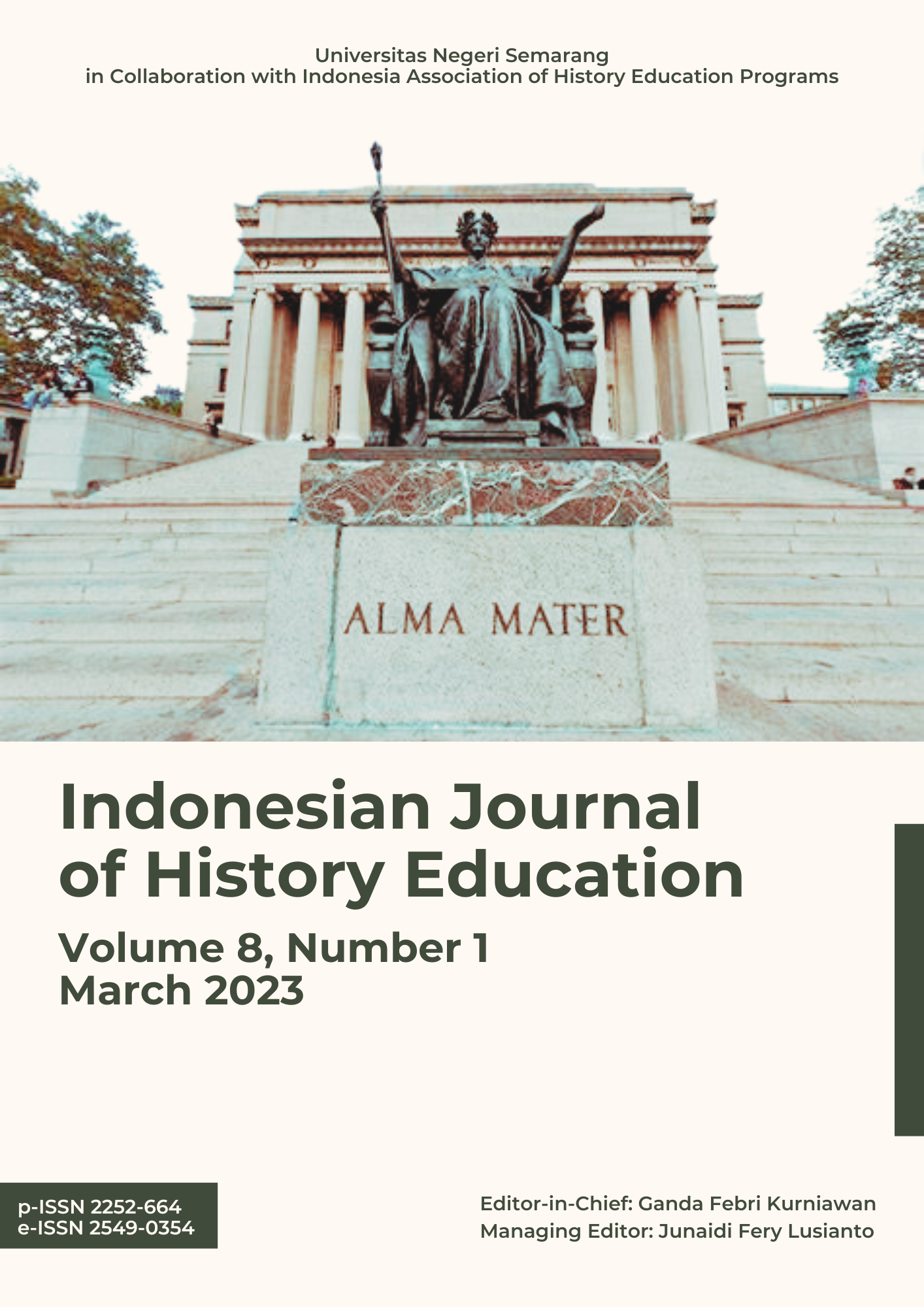Cultural Penetration: Post-Modern Threat to Historical Learning
Abstract
According to the view of post-modernism in the world of education, humans are no longer subjects and actors to take advantage of science and technology but fall trapped into objects and targets controlled by science and technology as a product of modernism. In fact, technology and information are currently the solution to the development of creativity in the learning process which is also reflected in the implementation of the independent learning curriculum. This research uses a qualitative paradigm with a literature study method. In-depth analysis of the process of elaboration and subjective meaning are the thing that is most highlighted in qualitative research. The theory is then used as a guide to align the research focus with the facts of the field. The research results obtained are described as follows: Post-Modern Threats, Cultural penetration in the historical learning, and Digitalization and historical empathy. The conclusion is that digitization in historical learning is an important literacy process and really requires technological advances. But furthermore, the packaging must still include the essence of the nation's values and character.
References
Anis, M. Z. A., Mardiani, F., & Fathurrahman, F. (2022). Digital History dan Kesiapan Belajar Sejarah di Era Revolusi 4.0. Fajar Historia: Jurnal Ilmu Sejarah Dan Pendidikan, 6(1), 29–42. https://doi.org/10.29408/fhs.v6i1.4375
Aruna, A., Inayah, L., Roziqin, M. F. A., & Prasetyo, A. R. (2021). Rancang Desain Media Pembelajaran Berbasis Game Sejarah Perjalanan Jendral Soedirman dalam Perang Gerilya Kabupaten Pacitan. Jurnal Basicedu, 5(5), 3866–3882. https://doi.org/10.31004/basicedu.v5i5.1450
Cai, L., Murad, M., Ashraf, S. F., & Naz, S. (2021). Impact of dark tetrad personality traits on nascent entrepreneurial behavior: the mediating role of entrepreneurial intention. Frontiers of Business Research in China, 15(1). https://doi.org/10.1186/s11782-021-00103-y
Fadli, M. R. (2021). Memahami desain metode penelitian kualitatif. Humanika, 21(1), 33–54. https://doi.org/10.21831/hum.v21i1.38075
Hidayat, A. R. (2017). Implikasi Postmodernisme dalam Pendidikan. Jurnal Filsafat, 1(1), 5–18.
Houtman, H. (2020). Merdeka Belajar Dalam Masyarakat 5.0. Prosiding Seminar Nasional Pendidikan, 39–46.
Kahar, M. I., Cika, H., Nur Afni, & Nur Eka Wahyuningsih. (2021). Pendidikan Era Revolusi Industri 4.0 Menuju Era Society 5.0 Di Masa Pandemi Covid 19. Moderasi: Jurnal Studi Ilmu Pengetahuan Sosial, 2(1), 58–78. https://doi.org/10.24239/moderasi.vol2.iss1.40
Kaharuddin, K. (2020). Kualitatif: Ciri dan Karakter Sebagai Metodologi. Equilibrium: Jurnal Pendidikan, 9(1), 1–8. https://doi.org/10.26618/equilibrium.v9i1.4489
Karmedi, M. I., Firman, F., & Rusdinal, R. (2021). Pendidikan Karakter dalam Pembelajaran Sejarah Selama Pandemi COVID-19. Journal of Education Research, 2(1), 44–46. https://doi.org/10.37985/jer.v2i1.45
Nasution, D. A. D., Erlina, E., & Muda, I. (2020). Dampak Pandemi COVID-19 terhadap Perekonomian Indonesia. Jurnal Benefita, 5(2). https://doi.org/10.22216/jbe.v5i2.5313
Nugraha, T. S. (2022). Kurikulum merdeka untuk pemulihan krisis pembelajaran. Inovasi Kurikulum, 19(2), 250-261.
Printina, B. I. (2017). Penggunaan Sumber Belajar Digital Exelsa Moodle dan Komik Toondo Dalam Meningkatkan Kreativitas Belajar Sejarah. Agastya: Jurnal Sejarah dan Pembelajarannya, 7(2). https://doi.org/10.25273/ajsp.v7i2.1489
Putra. (2022). Gagasan Generasi Millenial dalam Mempertahankan Budaya Tradisional dalam Masa Transisi Era Society 5.0 yang semakin berkembang pesat di Era Globalisasi. Prosiding Webinar Nasional Pekan Ilmiah Pelajar (PILAR), 134–142.
Rahman, F. (2017). Tantangan Pendidikan Di Era Postmodernisme. Al-Riwayah: Jurnal Kependidikan, 9(2), 323–348. https://doi.org/10.32489/al-riwayah.
Setiawan, J., & Sudrajat, A. (2018). Pemikiran Postmodernisme Dan Pandangannya Terhadap Ilmu Pengetahuan. Jurnal Filsafat, 28(1), 25. https://doi.org/10.22146/jf.33296
Abdullah, S. H. & Aini Hassan. (2007). Empati Sejarah Dalam Pengajaran Dan Pembelajaran Sejarah. Malaysian Journal of Educators and Education, 61–74.
Suhaedading, L. I. (2020). Pembatasan Sosial Berskala Besar (PSSB) saat Pandemi COVID-19 dan Dampaknya bagi Pasar Modal Indonesia. Abiwara: Jurnal Vokasi Administrasi Bisnis, 2(1), 33–37. https://doi.org/10.31334/abiwara.v2i1.1053
Sujana. (2019). Fungsi Dan Tujuan Pendidikan Indonesia. ADI WIDYA: Jurnal Pendidikan Dasar, 4(1), 29 –39. http://ejournal.ihdn.ac.id/index.php/AW
Surbakti, A. (2017). Generasi milenial indonesia, media, dan warisan budaya. Prosiding ‐ Seminar Nasional, 361–370. https://economy.okezone.com/
Sutarman, E. (2014). Implementasi Guru Sejarah Dalam Menerapkan Kurikulum 2013 Di Kelas X Di Sma N 1 Rembang Tahun Ajaran 2014/2015. Indonesian Journal of History Education, 3(2), 36–46.
Teknowijoyo, F. (2022). Relevansi Industri 4.0 dan Society 5.0 Terhadap Pendidikan Di Indonesia. Educatio, 16(2), 173–184. https://doi.org/10.29408/edc.v16i2.4492
Wahana, H. D. (2015). Pengaruh Nilai-Nilai Budaya Generasi Millennial dan Budaya. Jurnal Ketahanan Nasional, 21(1), 14-22.
Widiadi, A. N., et al. (2022). Merdeka Berpikir Sejarah: Alternatif Strategi Implementasi Keterampilan Berpikir Sejarah dalam Penerapan Kurikulum Merdeka. Sejarah dan Budaya: Jurnal Sejarah, Budaya, dan Pengajarannya, 16(1), 344–354. https://doi.org/10.17977/um020v13i22019p
Copyright (c) 2023 IJHE

This work is licensed under a Creative Commons Attribution 4.0 International License.
Copyright Notice
An author who publishes in the Jurnal Indonesian Journal of History Education agrees to the following terms:
- Author retains the copyright and grants the journal the right of first publication of the work simultaneously licensed under the Creative Commons Attribution-ShareAlike 4.0 License that allows others to share the work with an acknowledgement of the work's authorship and initial publication in this journal
- Author is able to enter into separate, additional contractual arrangements for the non-exclusive distribution of the journal's published version of the work (e.g., post it to an institutional repository or publish it in a book) with the acknowledgement of its initial publication in this journal.
- Author is permitted and encouraged to post his/her work online (e.g., in institutional repositories or on their website) prior to and during the submission process, as it can lead to productive exchanges, as well as earlier and greater citation of the published work (See The Effect of Open Access).
Read more about the Creative Commons Attribution-ShareAlike 4.0 Licence here: https://creativecommons.org/licenses/by-sa/4.0/.




